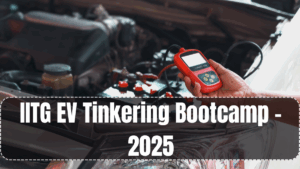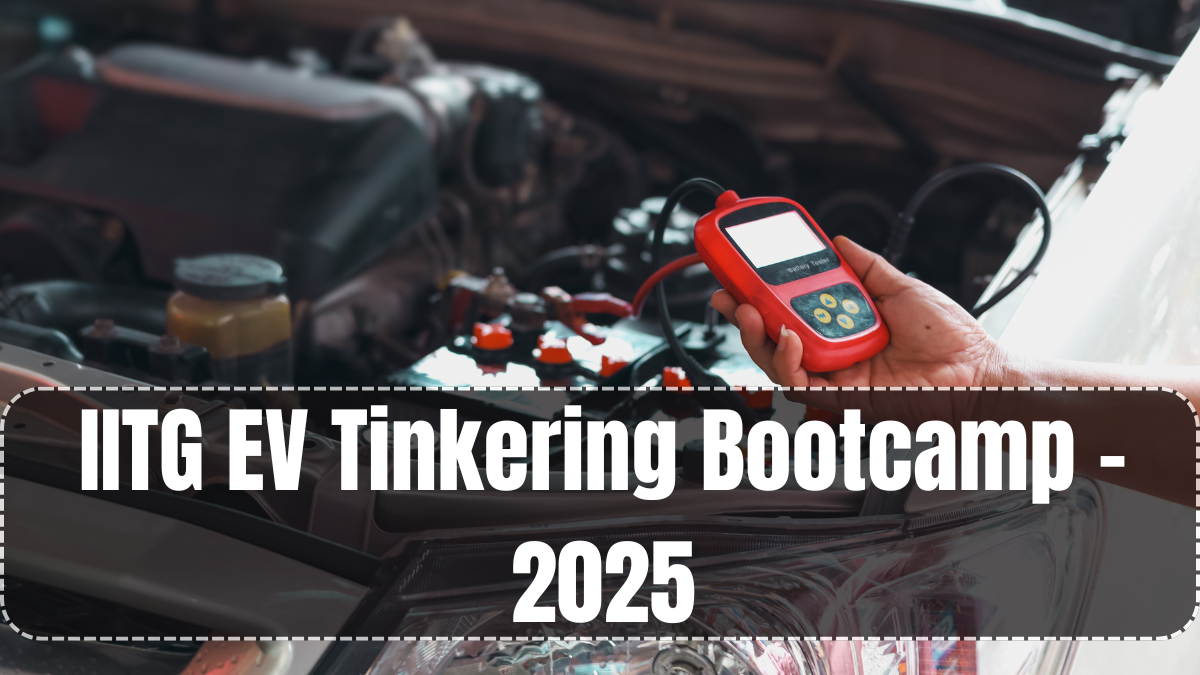IIT Guwahati is back with its much-anticipated EV Tinkering Bootcamp 2025, a week-long, fully immersive workshop for students passionate about electric vehicles, clean mobility, and automotive engineering. Scheduled for Summer 2025, this hands-on initiative empowers young minds to experiment, prototype, and innovate with real EV hardware and software tools.
Targeted at engineering students, diploma holders, and tech enthusiasts, the bootcamp is designed to foster next-gen solutions in electric mobility through practical learning, team challenges, and mentorship from industry veterans.

What is the EV Tinkering Bootcamp?
The EV Tinkering Bootcamp is a project-based learning program where students form teams and work on designing, assembling, and simulating basic electric vehicle systems. Hosted by the IITG Mechanical Engineering and E-Mobility Research Labs, the workshop introduces learners to:
-
EV powertrain components
-
Battery management systems (BMS)
-
Motor controllers and regenerative braking
-
IoT-based vehicle monitoring
-
Smart dashboard and UX mockups
-
Sustainable chassis design
Participants don’t just listen to lectures—they build real prototypes, code basic control logic, and test models on simulation software and mini tracks.
Bootcamp Highlights and Learning Outcomes
The 2025 edition of the bootcamp will feature upgraded modules based on feedback from past batches and new trends in the EV ecosystem.
Core Activities Include:
-
EV Design Thinking Workshop
-
Soldering and assembling brushless motors
-
Battery safety simulation
-
Building a mini EV using Arduino-based controllers
-
Pitching your EV project idea to a jury panel
Learning Outcomes:
-
Understand the basics of EV architecture and BMS logic
-
Gain hands-on experience with real sensors and control boards
-
Learn how to test energy efficiency and torque response
-
Build teamwork and pitch skills for future EV startup pitches
Who Can Apply and How to Register
Eligibility:
-
Students in 2nd/3rd/4th year of engineering or diploma (Mechanical, Electrical, Mechatronics, ECE, CS with interest in EVs)
-
Recent graduates or final-year project teams
-
Age group: 17 to 26
Team Size: Individual or team of 2–4 students
Application Deadline: May 20, 2025
Registration Fee: ₹2,500 per participant (includes kit access, meals, and certification)
How to Apply:
-
Fill out the online registration form on IITG’s EV Cell website
-
Upload college ID and personal statement (max 200 words: “Why EV?”)
-
Payment via UPI, NetBanking, or campus counters
Schedule & Venue Details
| Date | Activity | Location |
|---|---|---|
| June 3 | Inauguration + Introduction to EVs | IITG Mechanical Block |
| June 4–6 | Hands-on Tinkering Sessions | EV Prototyping Lab |
| June 7 | Group Presentations + Track Demo Day | EV Mini Track, IITG |
| June 8 | Certificate Ceremony + Networking Meet | Main Auditorium, IITG |
All participants will receive a Certificate of Completion from IITG’s EV Innovation Cell.
Why Join the IITG EV Bootcamp?
In a world rapidly transitioning to clean transport, being EV-literate and hands-on ready is a major edge. This bootcamp is not just about learning—it’s about doing.
Benefits include:
-
Mentorship from EV startup founders and professors
-
Opportunity to join the EV Research Internship Pool
-
Letters of Recommendation for top performers
-
Real prototyping experience you can showcase in resumes and interviews
FAQs
Is prior experience in EVs required to join?
No, the bootcamp is beginner-friendly. Basic electronics or engineering knowledge is helpful but not mandatory.
Will I receive components to take home?
While the kit stays at the lab, top performers will receive DIY take-home mini EV kits.
Are hostel facilities available?
Yes, paid hostel accommodation is available on campus for outstation participants. Meals are included in the bootcamp fee.
Can students from private colleges outside Assam join?
Yes, the bootcamp is open to students from all over India.
What kind of certificate is provided?
You will receive a Certificate of Completion from IITG’s E-Mobility Innovation Cell, which is valued across academic and industry platforms.
Click here to know more.
